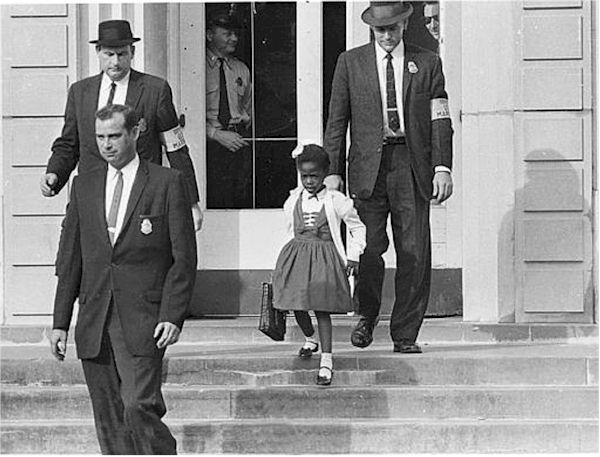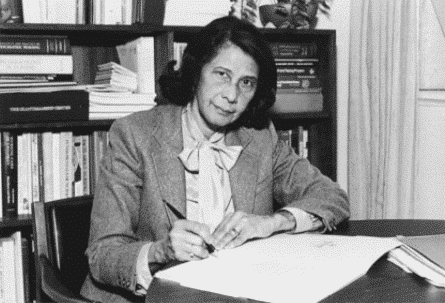
Ruby Bridges with US marshals, Uncredited DOJ photographer, via wikimedia
Lucille Bridges was the daughter of sharecroppers living in the Deep South. She had to leave school after the eighth grade so that she could work to help her family make ends meet. She wanted much more for her daughter. After the Supreme Court’s decision in Brown v. Board of Education, Lucille decided that her daughter Ruby should get the best available education by attending a then all-White elementary school. Her husband was fearful for their daughter, but Lucille insisted that Ruby attend the William Frantz Elementary School in New Orleans.
When Ruby prepared to go to school that first day, Lucille simply said to Ruby, “You’re going to a new school today, and you better behave.” Ruby did behave, but the White adults did not. In order to get in and out of the school, Ruby had to be accompanied by U.S. marshals. Crowds along the way cussed at them. They threw garbage.
When Ruby arrived at school, she was the only child in the classroom. Parents had withdrawn their children from the school. Ruby’s father was fired from his job. Ruby’s grandparents were evicted from the farm where they had lived for 25 years. Grocery stores refused to sell to the family. But Lucille insisted that Ruby had a right to attend the Frantz elementary school—and that she would continue to make good on that right.
While the Bridges family suffered by insisting upon their rights, they opened schoolhouse doors across the country for children of color. Norman Rockwell, the famed painter of American cultural icons, shamed American citizens with his painting The Problem We All Live With. Rockwell’s painting has been revived in a photo illustration by Gordon Jones and Bria Goeller in which they show Ruby’s shadow being cast by newly elected Vice President Kamala Harris.
Citizens in every society have certain rights. Amendments to the U.S. Constitution set forth certain basic civil rights for all members of our democratic experiment. But these rights on paper mean nothing if Americans don’t advocate for them for everyone. This advocacy may be painful, but it is necessary if society is to advance.
Those who insist on their rights are pioneers in advancing our society and the organizations which make up our society. Lucille Bridges was a pioneer in advocating for the rights of her daughter Ruby. Just think of how tiny six-year-old Ruby became the child who would begin the slow process of integrating schools across the South. By exercising a right for her daughter, Lucille unleashed a democratic vibrancy that has enriched our society. Our rights are essential for our democracy, but we have to exercise, and even fight for, those rights or they will atrophy.
Just imagine the courage that Lucille Bridges must have had in asserting the rights to an education for her daughter. Just imagine how brave any of us would have to be in asserting our rights even when doing so would face intense opposition. Just imagine what would happen to our rights as democratic citizens if we don’t take actions to assert them for ourselves and for others. As authoritarian forces continue to rise up to threaten the equality and freedom we should all enjoy as democratic citizens, we need the courage to stand fast and assert our democratic rights, just as Lucille Bridges did.
* * *
Don’t follow the path. Go where there is no path and begin the trail. When you start a new trail equipped with courage, strength and conviction, the only thing that can stop you is you!—Ruby Bridges
This is part of our “Just Imagine” series of occasional posts, inviting you to join us in imagining positive possibilities for a citizen-centered democracy.



